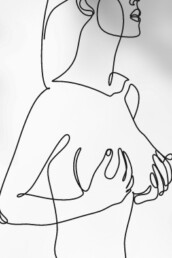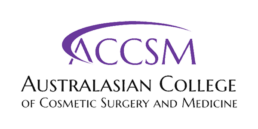Avenue Aesthetic Surgery is here to help you make the informed choice
Are you concerned about your Breast Implants?
Breast Implant Illness has only been recognised in recent years. Although initially thought to be due to silicone toxicity or toxicity from heavy metals, it is now becoming clearer that it is often associated with textured silicone implants.
Textured implants were designed to bind to the tissues like Velcro®. In other words, they have been designed to stay in position and not move around the way smooth-walled implants are able to do. However, in many women, the implants do not attach to the surrounding tissues and their movement results in a ‘sand paper’ effect where the rough surface is constantly abrading the surrounding tissues. This causes inflammation (these inflammatory cells are clearly seen when the capsule is examined microscopically) and the chronic inflammation can result in symptoms such as fatigue, foggy thinking, memory loss, skin rashes, night sweats, hair loss, joint pains etc.
If one calculates the surface area of 2 breast implants, it is approximately equivalent to 2/3rds of your arm or 6% of total body surface area. If you had a chronic unhealed burn or chronic rash of about 6% of your body surface area you could imagine that this would make you feel quite unwell. This, we believe, may be the case with textured breast implants and the cause of Breast Implant Illness.
In extreme cases the chronic inflammation can lead to a condition known as Anaplastic Large Cell Lymphoma (ALCL) which is a type of cancer developing in the capsule.
Many textured breast implants have now been withdrawn from use in Australia, but their popularity over the last 20 years has resulted in many thousands of women having textured silicone implants and therefore at risk of problems relating to the texture.
Symptoms associated with Breast Implant Illness
Below is listed the most common signs and symptoms of Breast Implant Illness. If you believe that you are suffering from these symptoms then you should discuss the matter with your doctor.
- Joint pain
- Muscle pain
- Fatigue
- Weakness
- Anxiety and depression
- Hair loss
- Memory loss
- Foggy thinking
- Night sweats
- Chemical sensitivities eg. to perfume, smoke and other inhalants
- Muscle inflammation
- Headaches
- Abdominal pain
- Chest pain
- Other autoimmune disorders, including rheumatoid arthritis, Sjogren’s syndrome, scleroderma and fibromayalgia
- Joint pain
- Muscle pain
- Fatigue
- Weakness
- Anxiety and depression
- Hair loss
- Memory loss
- Foggy thinking
- Night sweats
- Chemical sensitivities eg. to perfume, smoke and other inhalants
- Muscle inflammation
- Headaches
- Abdominal pain
- Chest pain
- Other autoimmune disorders, including rheumatoid arthritis, Sjogren’s syndrome, scleroderma and fibromayalgia
Many women with textured breast implants are now electing to have their implants removed and replaced either with smooth-walled implants or with their own fat. Avenue Aesthetic Surgery practitioners have completed hundreds of fat transfer procedures since 2013, and we have seen that even a small amount of fat when strategically placed into the cleavage area can produce desired results. Many women, having endured the hardness and artificial look of implants for many years, are choosing to have their implants removed and replaced with an augmentation comprising their own fat. A secondary benefit is that excess fat in the hips or thighs is removed and utilised for the fat augmentation procedure.
It is important to note that some manufacturers of breast implants deny the existence of Silicone Immune Toxicity Syndrome, or Breast Implant Illness, as do some doctors. However, the evidence for the existence of this syndrome is that many women report greatly enhanced wellbeing once their breast implants have been removed. When questioned closely, some women with breast implants recognise that they may have a mild form of the illness but still see great benefits in retaining their breast implants.
We encourage you to read a blog written by Dr Allan Kalus on the ‘Era of the Explant’ to learn more.
Doctors need to be alert to the existence of this condition and to be aware that, for some women, removing their breast implants can result in considerable health benefits.
Breast Augmentation by Autologous Fat Transfer
Women who believe they are suffering from Breast Implant Illness are encouraged to have their breast implants removed. They may consider replacing the implants with their own fat. The procedure of breast augmentation by autologous fat transfer is now well established and is a useful procedure both for women who wish to avoid implants altogether or for those having their implants removed and replaced.
At Avenue Aesthetic Surgery, our experience is that, following removal of the implants, most women experience better health and wellbeing. Most of their symptoms have gone or significantly lessened by 6 weeks following surgery.
Blog Article:
Era of the Explant
The article draws attention not only to the risk of a serious illness (Breast Implant Associated Anaplastic Large Cell Lymphoma), known as BI-ALCL, but also to the increasingly recognised syndrome of Breast Implant Illness (BII).
The cost of breast augmentation can vary from patient to patient depending on the procedure. To ensure complete accuracy, we can determine pricing during your first consultation after we have been able to gain an insight into what is necessary for your individual case. Our surgery is designed to treat each patient individually, giving you a completely tailored experience.
Get in touch today to discuss the cost of your breast augmentation.
*ANY SURGICAL OR INVASIVE PROCEDURE CARRIES RISKS. BEFORE PROCEEDING, YOU SHOULD SEEK A SECOND OPINION FROM AN APPROPRIATELY QUALIFIED HEALTH PRACTITIONER.



